Pregnancy is an incredibly special time in a woman’s life. As your body works to nourish and grow a new life, every decision you make matters — especially when it comes to your diet. You’ve likely been told about all the foods you should eat to stay healthy and help your baby grow, but it’s just as important to know which foods to avoid. Certain foods can be harmful to both you and your baby, leading to complications such as foodborne illnesses, developmental issues, or even miscarriage. In this guide, we’ll walk you through 26 foods that pregnant women should avoid and provide safe alternatives, so you can ensure a healthy pregnancy.
Let’s get started on the path to a healthier you and a thriving baby!
- 1. Fish Containing High Levels of Mercury
- 2. Smoked Seafood
- 3. Fish from Contaminated Waters
- 4. Raw Shellfish
- 5. Raw or Undercooked Eggs
- 6. Raw or Undercooked Meat and Poultry
- 7. Deli Meats
- 8. Unpasteurized Milk and Dairy Products
- 9. Soft Cheeses
- 10. Unwashed Fruits and Vegetables
- 11. Raw Sprouts
- 12. Foods that Cause Allergies
- 13. Restaurant-Made Salads
- 14. Unpasteurized Juices
- 15. Excess Caffeine
- 16. Herbal Teas
- 17. Canned Foods
- 18. Nitrate-Rich Foods
- 19. Sugar-Rich Foods
- 20. Street Foods
- 21. Fatty Foods
- 22. Artificial Sweeteners
- 23. Excess Vitamins
- 24. Homemade Goodies
- 25. Licorice
- 26. Leftovers
1. Fish Containing High Levels of Mercury
Fish like shark, swordfish, king mackerel, and tilefish are high in mercury, a toxic substance that can cause brain damage and developmental delays in babies. Mercury turns into methylmercury in the body, which is particularly harmful to the developing nervous system of your unborn child.
Solution: Opt for fish that are lower in mercury, such as salmon, cod, catfish, and canned light tuna. According to the FDA, you can safely consume 8-12 ounces (2-3 servings) of these low-mercury fish per week. However, limit Albacore or white tuna to 6 ounces per week. Omega-3 rich fish help in brain and heart development, making them essential during pregnancy.
| Fish to Avoid | Safer Alternatives |
|---|---|
| Shark, Swordfish | Salmon, Cod, Catfish |
| King Mackerel, Tilefish | Canned Light Tuna |
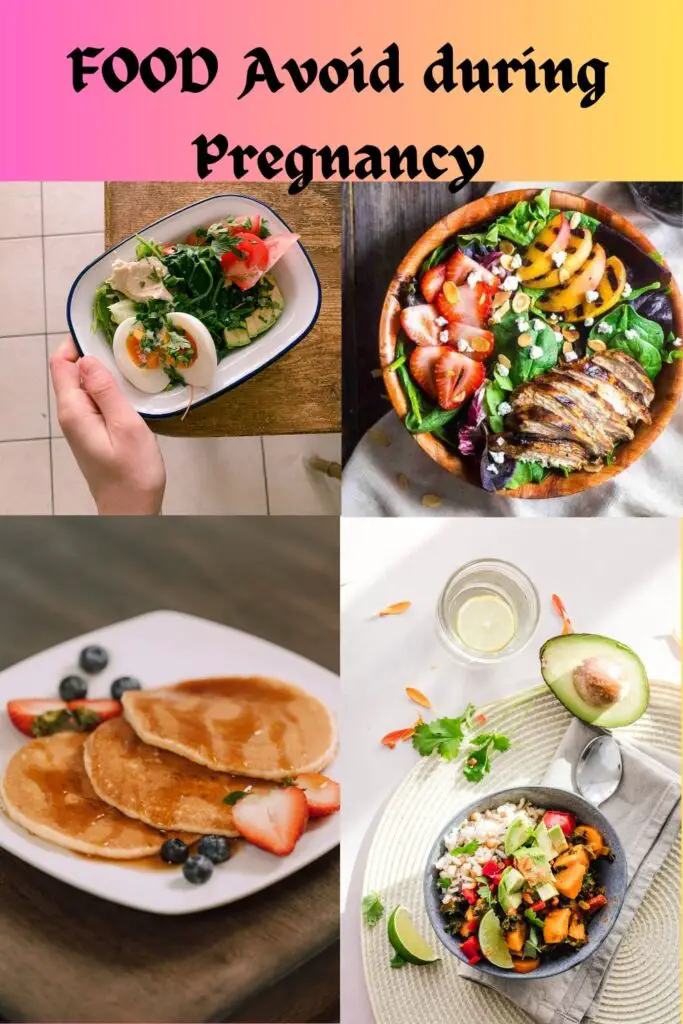
2. Smoked Seafood
Smoked or refrigerated seafood like lox, jerky, and kippered fish may harbor Listeria monocytogenes, bacteria that can cause listeriosis. Pregnant women are at a higher risk of contracting this illness, which can lead to miscarriage or stillbirth.
Solution: If you crave smoked fish, opt for canned smoked seafood, which is safer. However, it’s best to limit this as much as possible.
3. Fish from Contaminated Waters
Fish caught in local rivers, lakes, and streams may contain harmful industrial pollutants such as PCBs (Polychlorinated Biphenyls). Exposure to these chemicals during pregnancy can result in low birth weight, developmental delays, and learning disabilities in babies.
Solution: Check local advisories before consuming fish from freshwater sources. Choose store-bought fish that is free from industrial contaminants.
4. Raw Shellfish
Raw shellfish like oysters, clams, and mussels can contain harmful bacteria and viruses that may lead to seafood-borne illnesses. These pose significant risks during pregnancy.
Solution: Ensure shellfish is thoroughly cooked before consumption. Cooking kills harmful bacteria, making them safe to eat.
5. Raw or Undercooked Eggs
Consuming raw or undercooked eggs increases your risk of contracting salmonella, a bacteria that causes food poisoning. While the symptoms of salmonella are unlikely to harm your baby, they can weaken your immune system and affect fetal development.
Solution: Stick to pasteurized eggs and egg products. Avoid dishes that contain raw eggs, such as homemade Caesar dressings, ice creams, and mayonnaise.
| Unsafe Foods Containing Raw Eggs | Safer Alternatives |
|---|---|
| Caesar Dressings, Hollandaise | Pasteurized Egg Products, Firm Omelets |
| Mousse, Tiramisu, Meringue | Cooked Eggs with Firm Yolks |
6. Raw or Undercooked Meat and Poultry
Raw or undercooked meat can be contaminated with harmful parasites like Toxoplasma gondii and bacteria such as salmonella, which increase the risk of toxoplasmosis and food poisoning. These can lead to miscarriage or severe health complications for your baby.
Solution: Make sure meat is cooked to safe internal temperatures: 160°F for ground meats, 145°F for whole cuts, and 165°F for poultry.
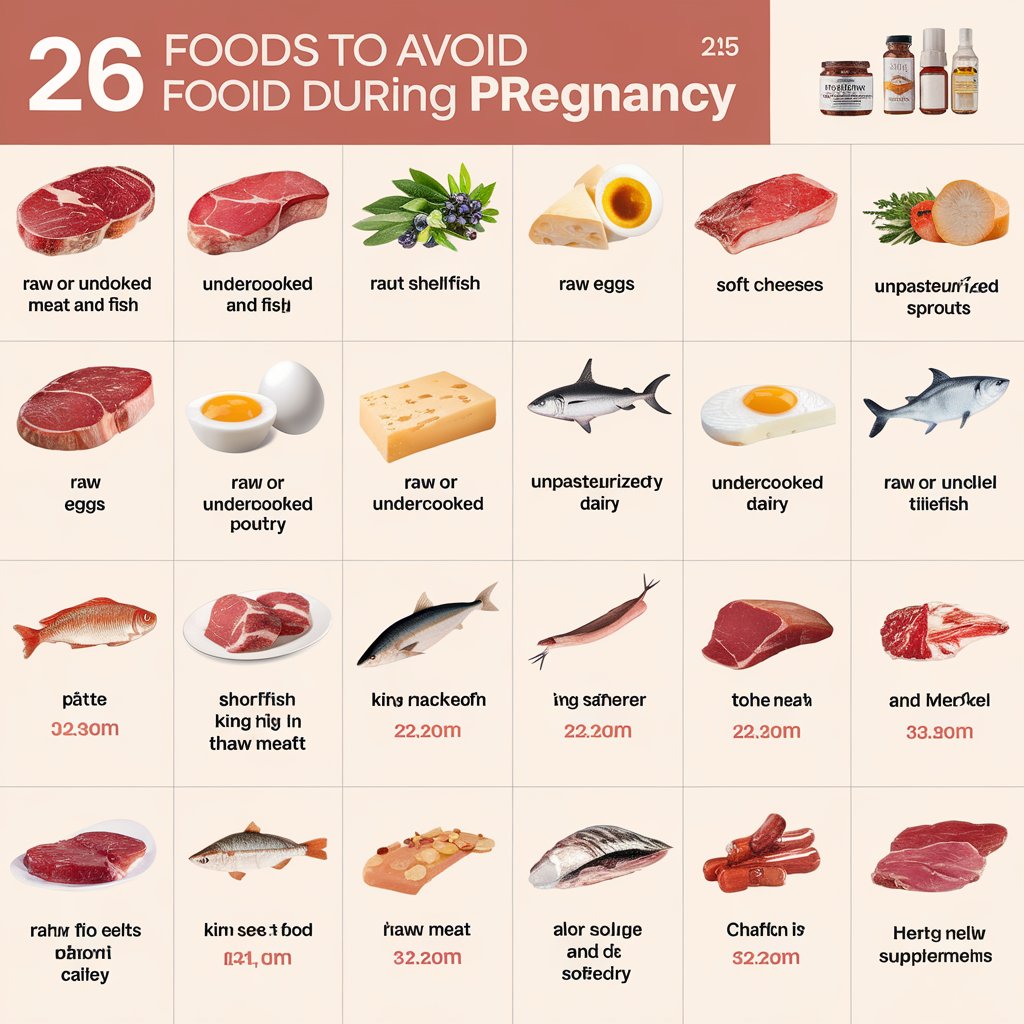
7. Deli Meats
Cold cuts and deli meats, including ham, hot dogs, and sliced meats, can harbor Listeria, a bacteria that can easily transfer from the mother to the placenta, leading to serious complications or fetal death.
Solution: If you must eat deli meats, reheat them until steaming hot to kill any bacteria.
8. Unpasteurized Milk and Dairy Products
Raw milk can contain harmful bacteria such as Salmonella and Listeria. It has no nutritional advantage over pasteurized milk, but a much higher risk of causing foodborne illness.
Solution: Always choose pasteurized dairy products. You can also try non-dairy alternatives like almond milk, soy milk, or oat milk, which are safe and nutritious.
9. Soft Cheeses
Unpasteurized soft cheeses like feta, brie, camembert, and blue cheese can harbor Listeria.
Solution: Stick to hard cheeses like cheddar and Swiss or ensure any soft cheese you consume is pasteurized.
10. Unwashed Fruits and Vegetables
Unwashed produce can be contaminated with Toxoplasma gondii, a parasite that poses a serious risk to your baby.
Solution: Thoroughly wash all fruits and vegetables under running water and scrub surfaces with a vegetable brush.
11. Raw Sprouts
Raw sprouts like alfalfa, clover, and radish are highly prone to contamination with harmful bacteria such as E. coli and Salmonella.
Solution: Only eat sprouts that have been thoroughly cooked.
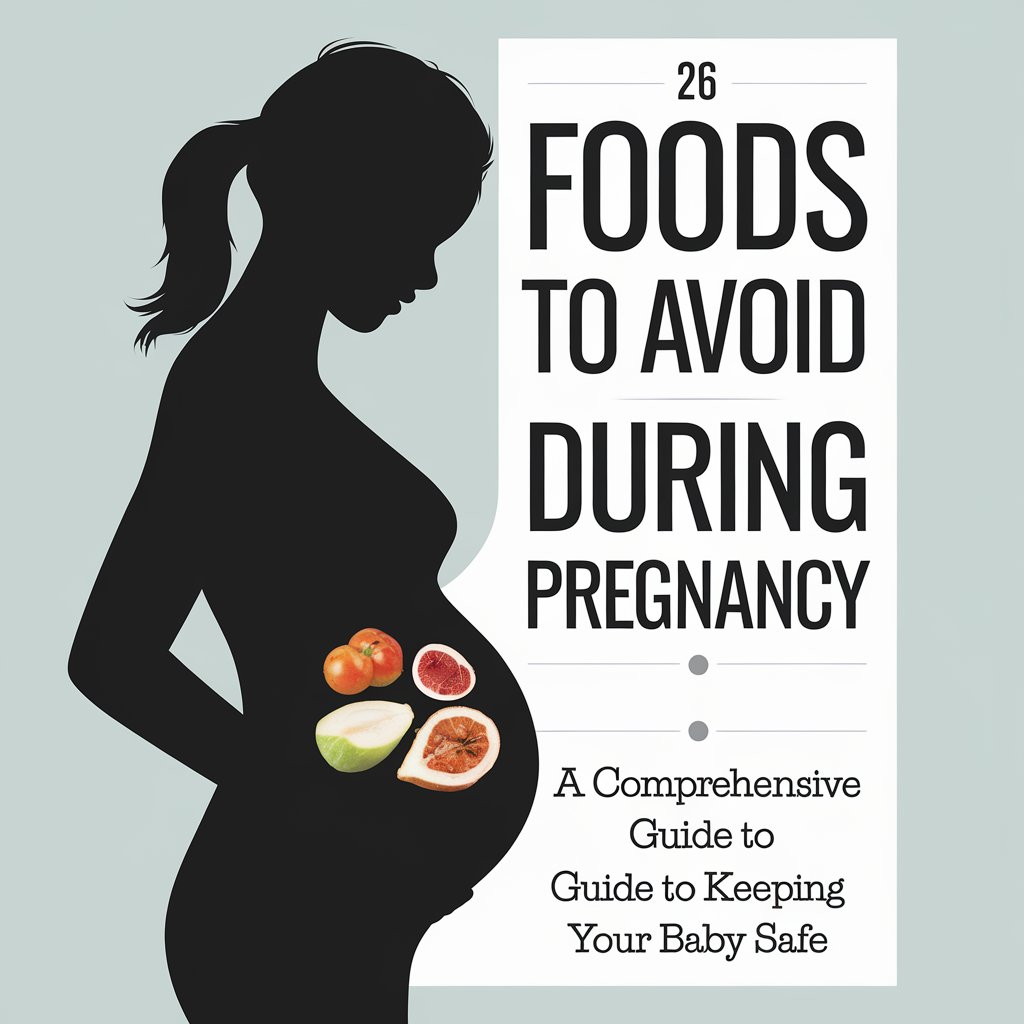
12. Foods that Cause Allergies
While you should avoid foods that you’re allergic to, some studies suggest that consuming allergenic foods like peanuts during pregnancy could lower the chances of your baby developing allergies. However, consult your doctor before making any dietary decisions.
13. Restaurant-Made Salads
Pre-made salads at restaurants may contain ingredients like deli meats or raw eggs, which increase the risk of bacterial contamination.
Solution: Make salads at home to ensure safe ingredients are used.
14. Unpasteurized Juices
Unpasteurized juices can carry harmful bacteria that may cause foodborne illness.
Solution: Choose pasteurized juices or make your own at home from washed produce.
15. Excess Caffeine
Excess caffeine has been linked to an increased risk of miscarriage and low birth weight. The recommended limit during pregnancy is 200mg of caffeine per day.
| Beverage | Caffeine Content (mg) |
|---|---|
| Coffee (8 oz) | 95-200 |
| Tea (8 oz) | 30-50 |
| Dark Chocolate (1 oz) | 20-30 |
Solution: Switch to decaffeinated beverages, particularly during the first trimester.
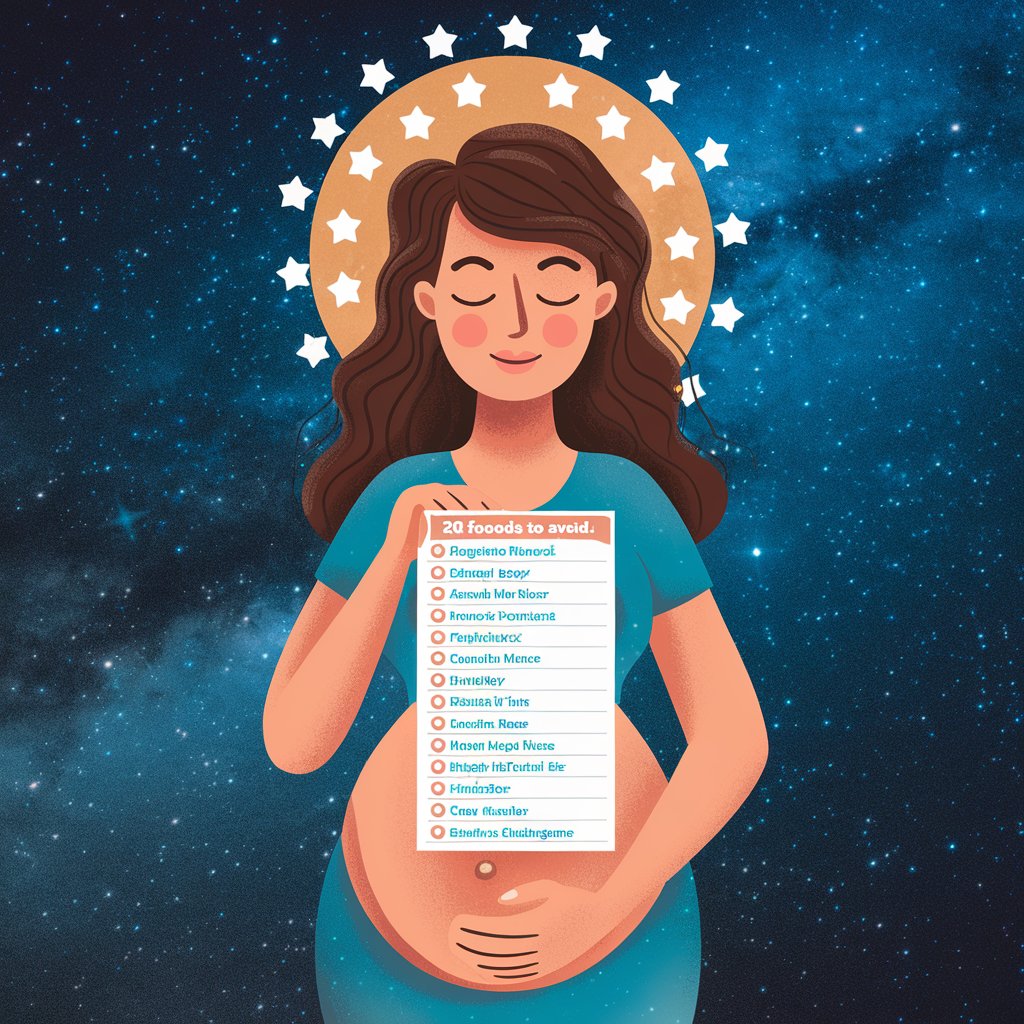
16. Herbal Teas
Certain herbal teas and seasonings, such as ephedra, kava kava, and black cohosh, can cause uterine contractions and even miscarriage.
Solution: Stick to regular tea or chai in moderation and consult your doctor before consuming any herbal teas.
17. Canned Foods
Canned foods may contain harmful chemicals like BPA (Bisphenol A), which disrupts fetal development and increases the risk of various health issues in pregnant women.
Solution: Opt for fresh or frozen foods and avoid canned goods when possible.
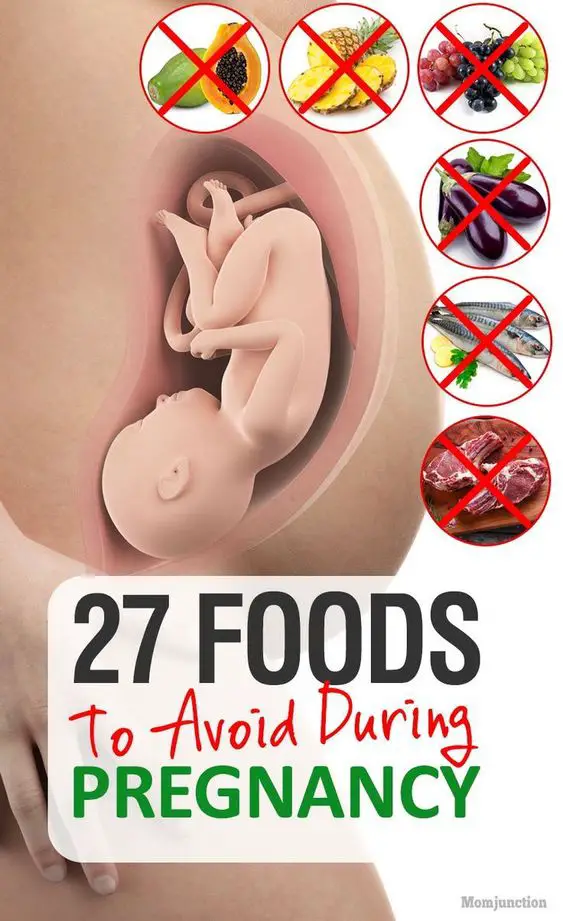
18. Nitrate-Rich Foods
Processed meats like bacon, hot dogs, and sausages contain nitrates, which are linked to cancer and developmental abnormalities in the fetus.
Solution: Choose fresh, well-cooked lean meats instead.
19. Sugar-Rich Foods
Excess sugar intake can worsen pregnancy discomforts like nausea and contribute to gestational diabetes, preeclampsia, and excessive weight gain.
Solution: Limit sweets and opt for natural sources of sugar like fruits.
20. Street Foods
Street foods can carry a high risk of contamination and foodborne illnesses due to poor hygiene standards.
Solution: Recreate your favorite street foods at home for a safer experience.
21. Fatty Foods
High-fat foods like fast food and processed snacks increase the risk of obesity and complications during pregnancy.
Solution: Opt for healthy fats from sources like avocados, nuts, and olive oil.
22. Artificial Sweeteners
The safety of artificial sweeteners is controversial, especially saccharin and aspartame. Saccharin can accumulate in fetal tissues, while aspartame should be avoided if you have phenylketonuria (PKU).
Solution: Use natural sweeteners in moderation.
23. Excess Vitamins
Excess intake of vitamins, especially fat-soluble ones like vitamin A, can be harmful to both mother and baby.
Solution: Stick to prenatal vitamins and natural food sources rather than supplements.
24. Homemade Goodies
Homemade treats like raw cookie dough and ice cream can contain bacteria that lead to food poisoning.
Solution: Use pasteurized ingredients and avoid consuming raw dough.
25. Licorice
Licorice contains glycyrrhizin, which can affect fetal development and increase the risk of learning disabilities.
Solution: Avoid licorice entirely during pregnancy.
26. Leftovers
Leftovers left at room temperature for over two hours can harbor bacteria.
Solution: Always eat freshly cooked food
or refrigerate leftovers promptly.
By following these guidelines and making safe food choices, you can promote a healthy pregnancy and reduce the risk of complications. Stay well-informed, consult your doctor when in doubt, and enjoy this incredible journey to motherhood!
